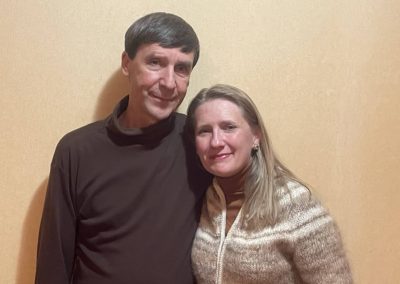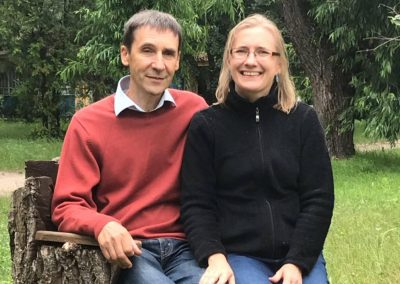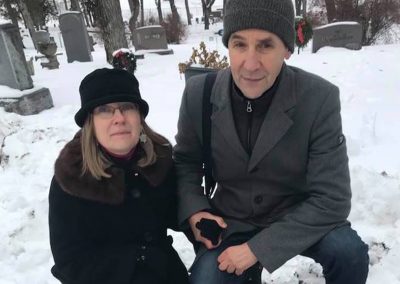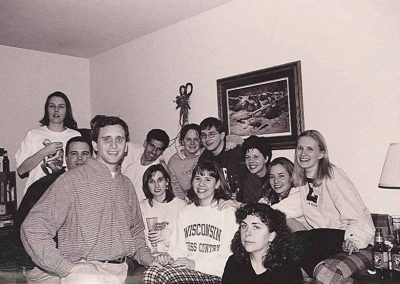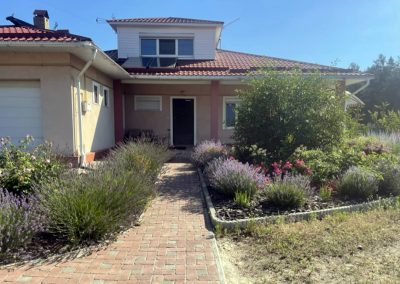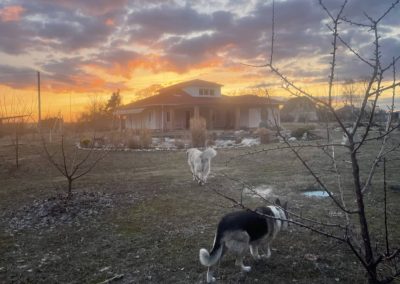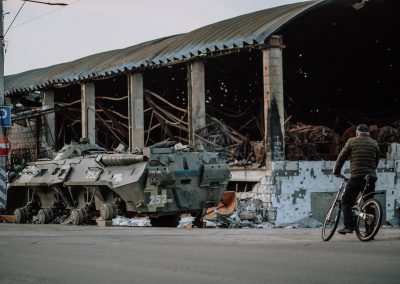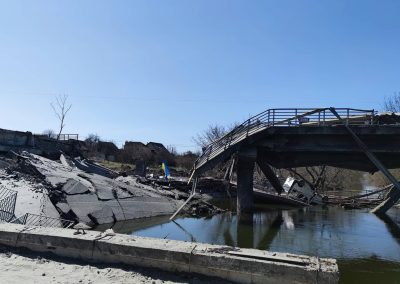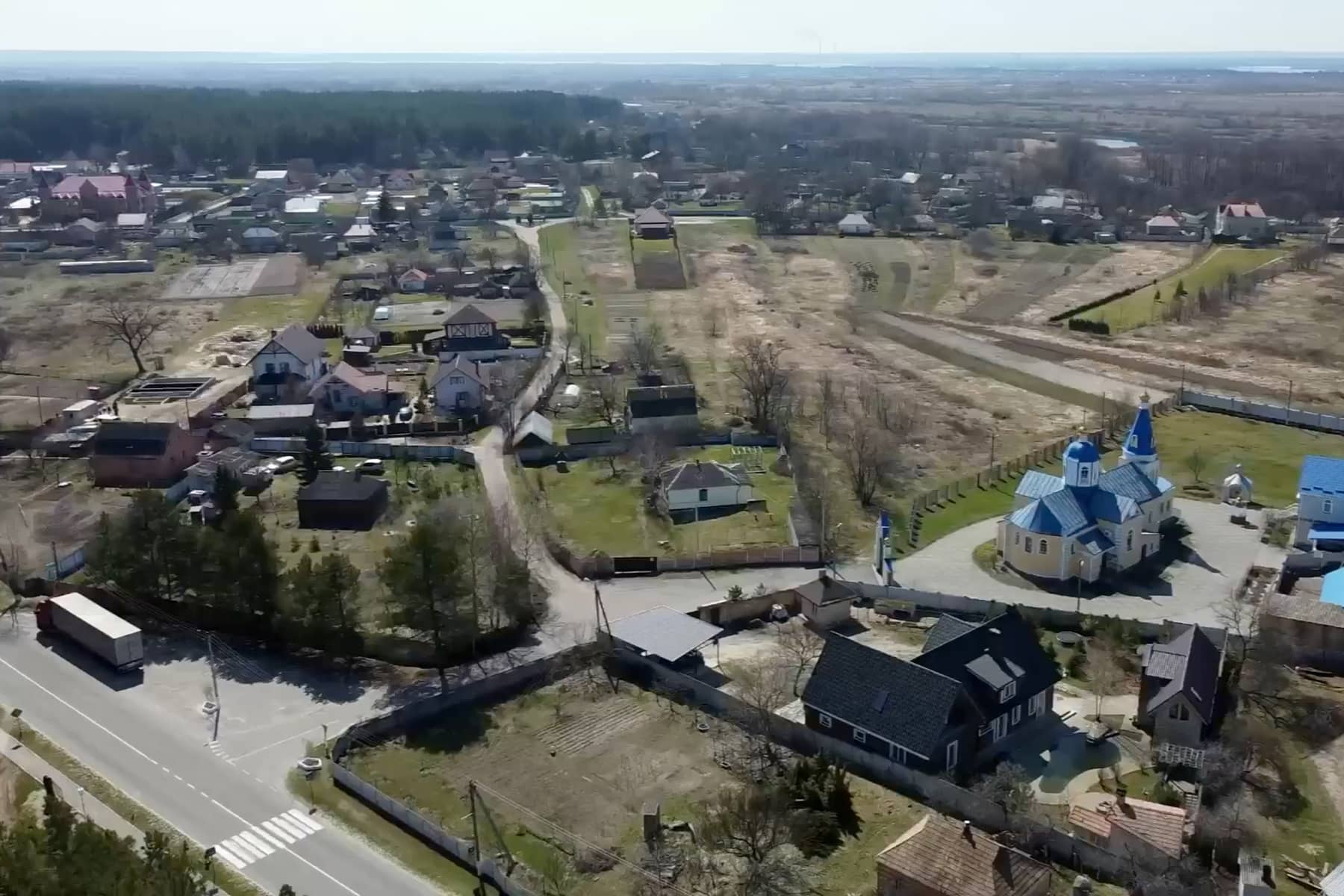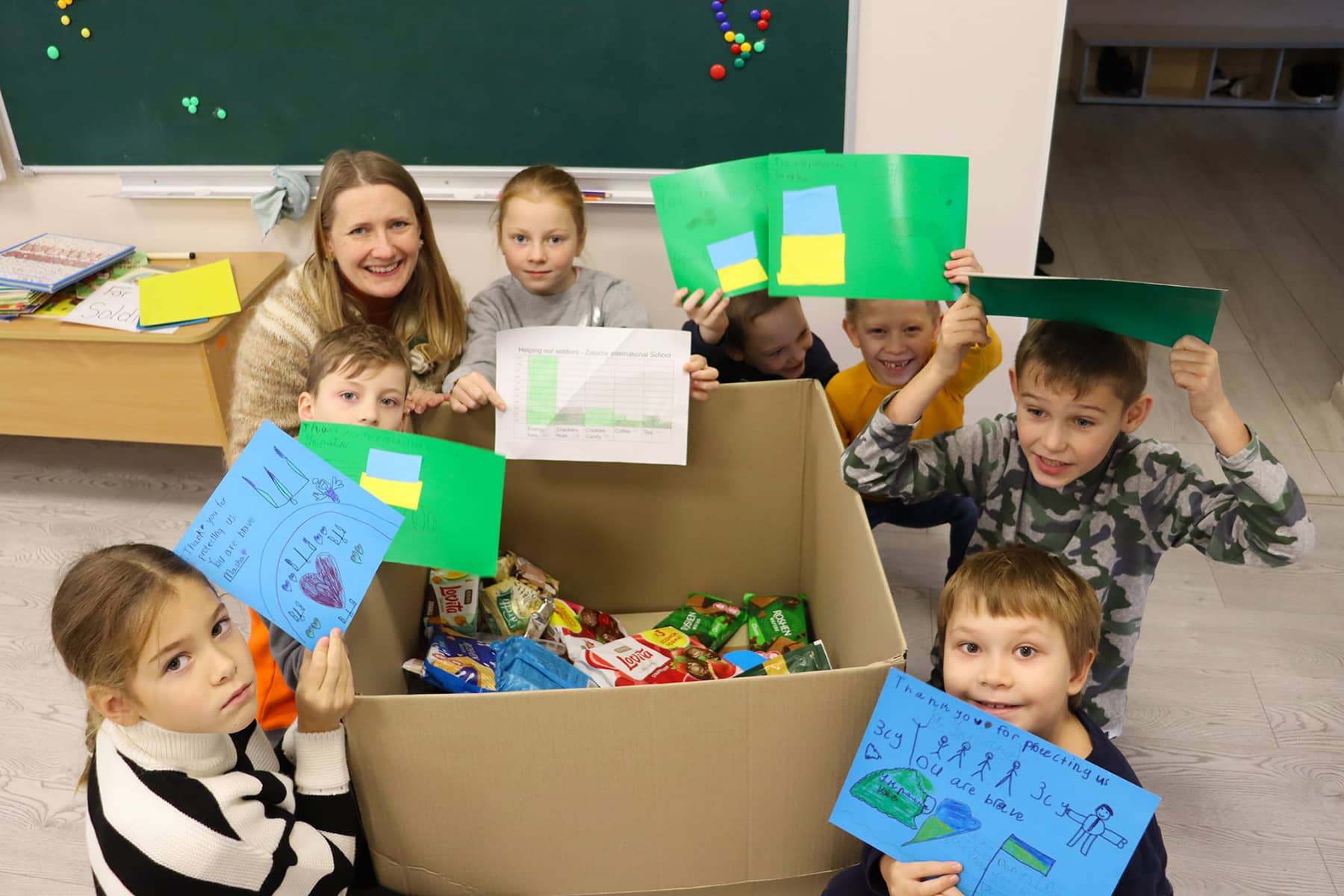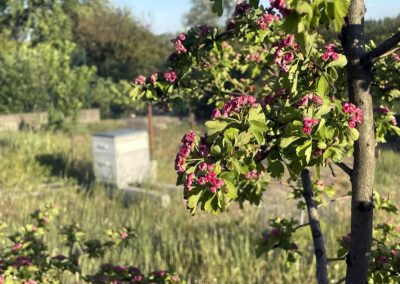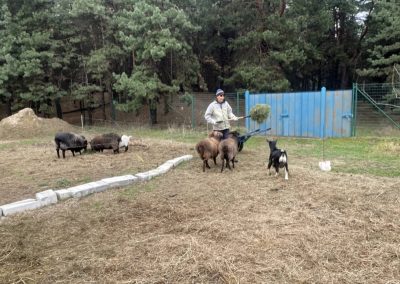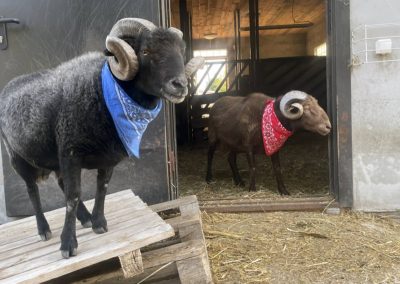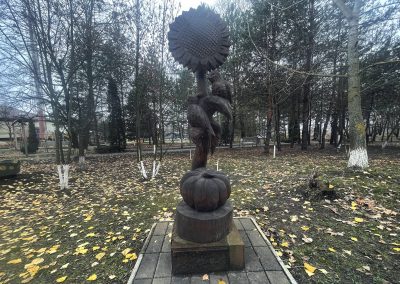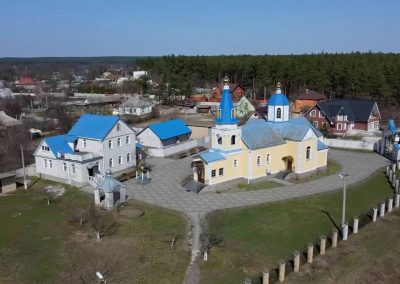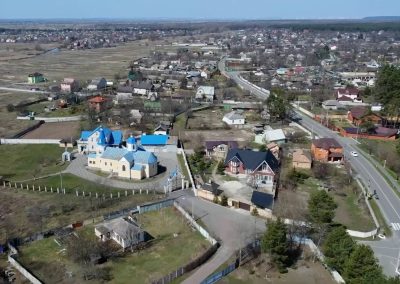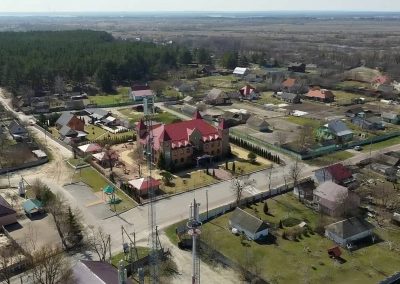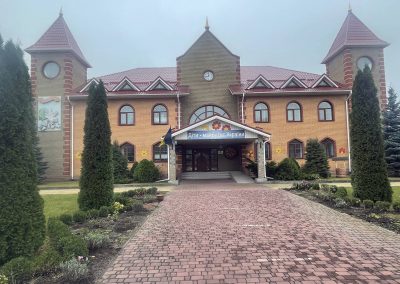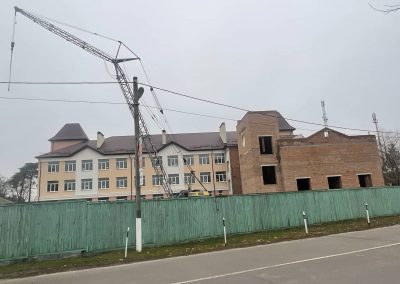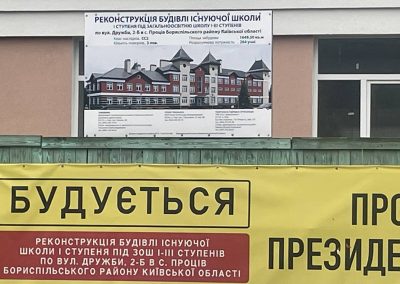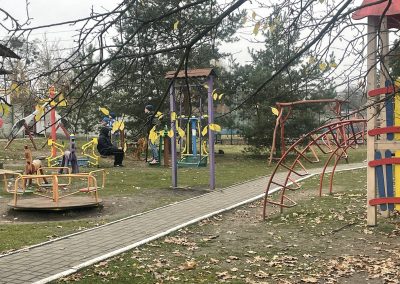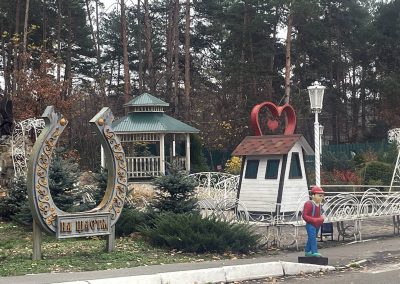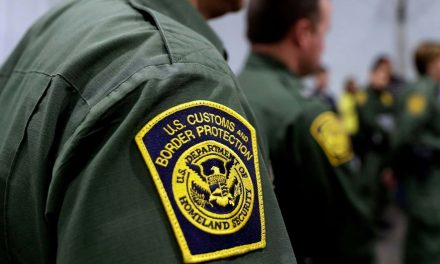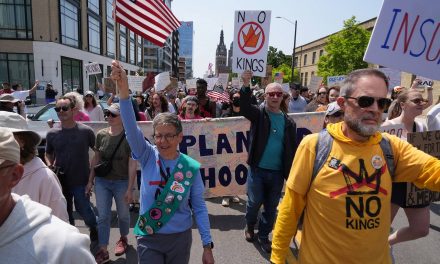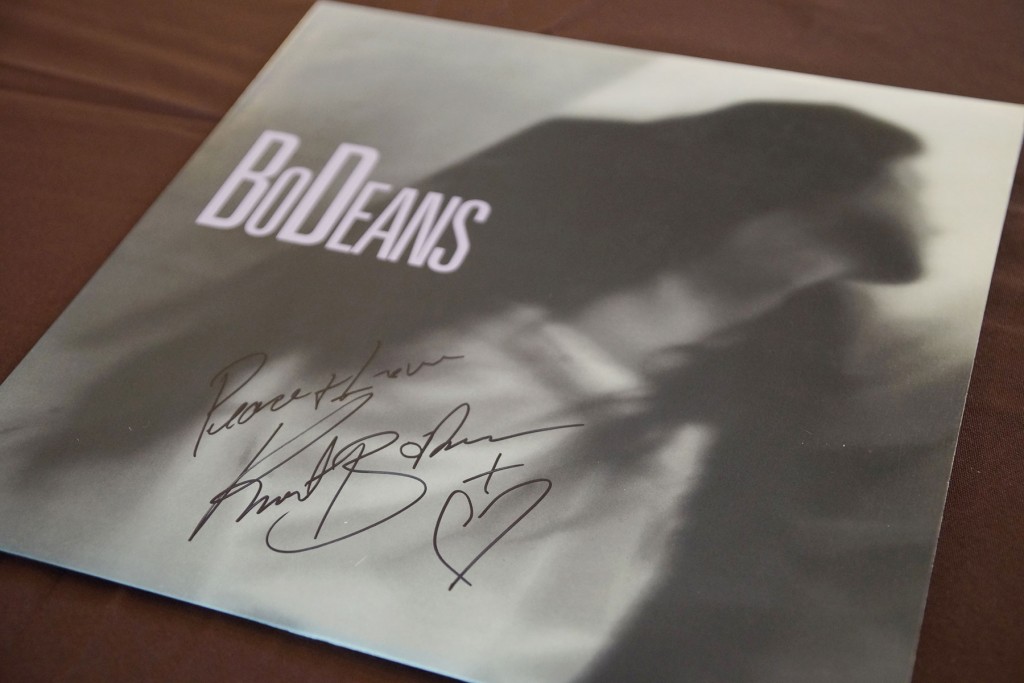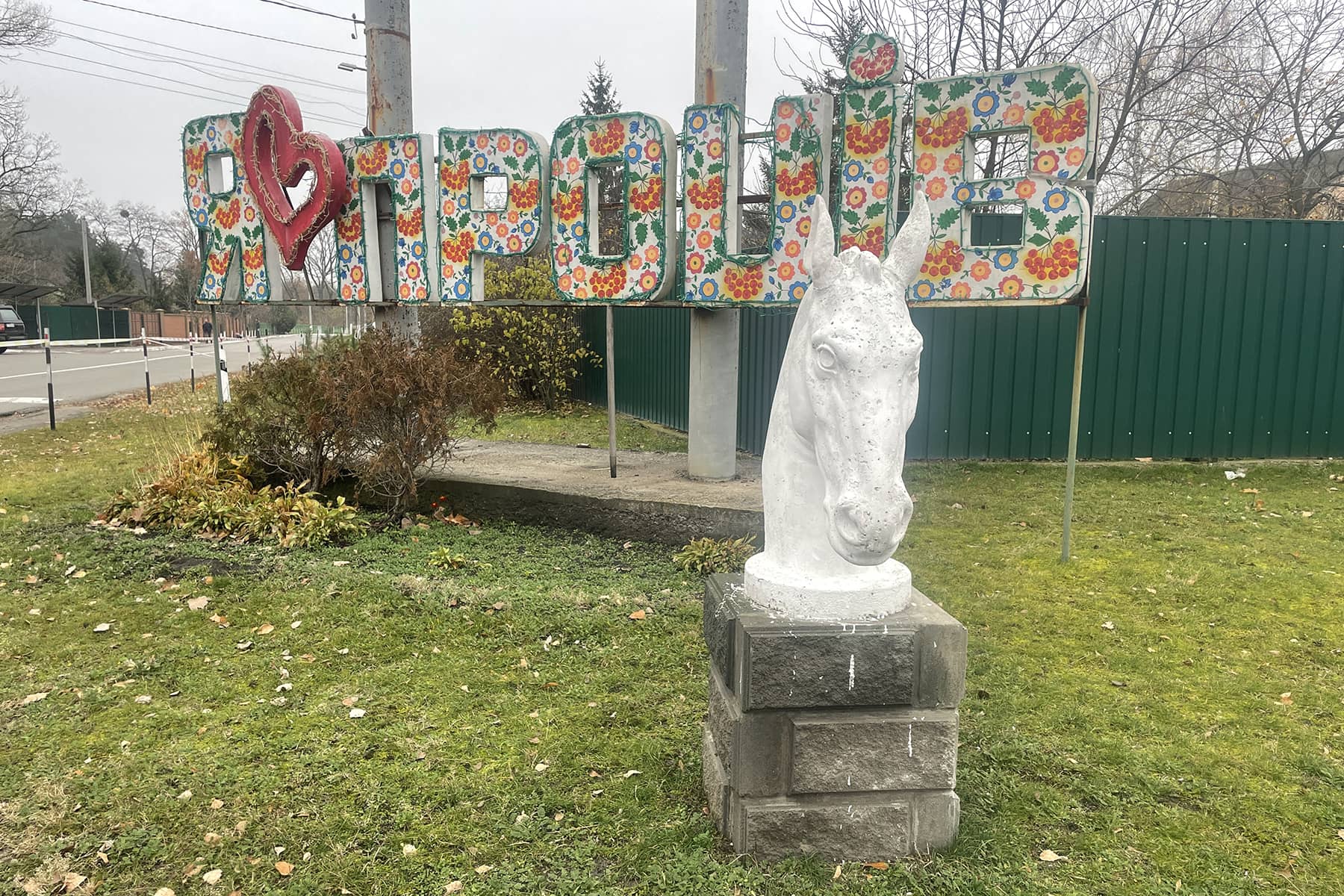
Diane Baima grew up in America’s midwest, being born and raised in Minnesota, attending college in Madison, and later working in Milwaukee. Her love of education would eventually bring her to Ukraine, where her hope for a peaceful post-Soviet era collided with the reality of Russia’s brutal full-scale invasion.
Her fascination with Soviet culture culminated towards the end of the Cold War, as tensions thawed and “perestroika” showed the possibilities of friendship between the two bitter rivals. In her teenager years, Baima believed that learning another language could help bring peace to countries divided by political ideology.
Language study opened a new world to Baima, and inspired her passion to give the gift of language and culture to a new generation. She went on to study Russian at the University of Wisconsin-Madison, and dreamed of being a Russian teacher.
Baima continued her studies in Moscow for several years, then would eventually return to Wisconsin to teach. She taught for ten years in Milwaukee Public Schools, half of that time at Allen Field Elementary. Language remained her skill for connecting with people, particularly in local immigrant communities.
By 2014, that ability would send her to Ukraine for work. After meeting her Ukrainian husband Yurii, she made the country her new home. When the full-scale invasion began in February, she fiercely refused to leave.
Baima’s rural home now provides shelter for displaced relatives, as she navigates a daily life surrounded by the threat of Russian attacks on civilians. Her village of Protsiv is near Milwaukee’s Sister City of Irpin.
At the beginning of the war, when asked why she was not leaving Ukraine, Baima said, “Whether I survive this war or not, I remain true to my teenage aspiration to help bring peace to the world – before I dreamt of diplomacy through language learning, but now is the time to fight.”
Now, nine months later, she continues to hold onto that elusive dream while supporting her adopted country.
Q&A with NAME HERE
Milwaukee Independent: Before the war began, what were some of your favorite experiences in the town where you live?
Diane Baima: I moved out to the village to be with Yurii in March 2019 when the school where I worked in Kyiv went online. I had planned to finish out the year in Kyiv and then move, but the pandemic made us change our plans. Before that, Yurii and I had dated for 2 ½ years. I spent my weekends in the village and worked at Kyiv international school in Kyiv, teaching fifth grade. Because of COVID, we did not leave our home much. The excitement for the week was a trip to the supermarket. I taught, and still teach, in a private school in a nearby village. Always masked and with little contact with anyone but the children for health and safety. Yurii and I enjoy gardening, and like to walk through the yard together to see the growth and changes. This is especially true in spring. (see footer tab: Gardening Collection) We have a special friendship with a landscape architect named Andre. In January, 2022 we had asked him to make a plan for putting terraces and a stairway in our front yard. We asked for both beauty and bounty along with it being dog friendly. Our dear Caucasian shepherd Dolly (weight 110 pounds) enjoys bounding through the yard to bark at all who pass by, and digging holes to enjoy the cool summer dirt. Our other dog is smaller and a bit easier on the landscape. So Andre began to measure and plan, but February 23 called him off to fight. He has been fighting in southern Ukraine, and informs us every once in a while that he is okay. We enjoy landscaping projects, but they are not essential to winning the war, so they are postponed. We continue to grow fruit and berries and vegetables for ourselves and friends. These projects keep us busy and make us feel hopeful. Before the war, we enjoyed having guests during the summer months especially. There is a small coniferous forest behind our house, and we face a prairie/wetland piece of land with streams running through it all the way to the Dnieper River. Both places are nice for walks and mushroom hunting.
Milwaukee Independent: When you first moved to Ukraine, what surprised you most about the people? And how were you treated as an American?
Diane Baima: I moved to Kyiv in August, 2014 to work at Kyiv International School. I had been living and working in an international school in Armenia for three years before that. And Milwaukee Public schools for ten years before that. I was shocked when I got to Kyiv. The people were so friendly and never made fun of or corrected my Russian language. I had lived in Moscow for five years in the 1990’s and everyone there always felt it was important to tell me if I had made a grammar mistake and that I had an accent. The women in Kyiv dressed stylishly, but casually and with bright colors. It was very welcome to me to not have to wear the usual black and beige of Armenia. In Armenia, everyone had a white, grey or black car. Here I saw a rainbow of cars to go with the clothing. Kyiv women also sometimes wore comfortable footwear, which is something I never saw in any of the other former Soviet Republics. The first people I met were the guards at my school. They helped orient me on where to buy a SIM card, food, etc. I felt at home immediately. My second day, I made plans to see a new friend, Dasha, from couch surfing, and we have been friends ever since. I loved walking and walking and walking through the city to see what it had to offer. I still do.
Milwaukee Independent: Since the invading Russian forces were driven out of the Kyiv region in April, what has your day-to-day experience been like?
Diane Baima: If I describe for you my day, you might not know that I am living in a country that is defending itself from invasion. Maybe you have a similar schedule, similar lifestyle, and similar interests. The differences and why they are different are subtle, but they show a bit about why Ukraine is fighting, and why Ukraine will be victorious.
Morning.
Alarm. Wake up. Check phone to make sure that all friends are still alive and safe. Check news to see if Ukraine is still independent. Sigh with relief and feed the cats. Make breakfast for myself, husband Yurii, and mother-in-law. Since the war started, Yurii watches the youtube version on NBC nightly news with Lester Holtz every morning as we eat. Somehow Lester has become a member of our family now. He gives us a bit of comfort by his continuous reporting of Ukraine, and all the other tragedies happening in the world. Yurii used to watch gardening shows before the war began.
Prepare for work.
Since February, our school has been online. There was a case of COVID, and then all the foreign teachers (except me) left for safer places when our embassies advised us to do so. I teach at a private school with a bilingual program. The children study in Ukrainian half the day, and English half the day. Since the war started, I have had two grades to teach because another English teacher quit when the war started. We taught online for all but the first week of the war. The children were scattered throughout Europe and Ukraine, but I was lucky that we had electricity and wi-fi 99% of the time so I could still teach. Without seeing the children each day, I would have had a much more difficult time getting through these past months. They gave me a focus, many smiles, much love, and a few heartaches (as teaching a class online will always be less optimal than in person.
Lunch.
My mother-in-law cooked so we had a variation on soup, piece of meat or fish, and potato or grain. EVERYDAY! If I could add a vegetable, it was welcomed by Yurii, and criticized by mom. Then tea. Run back to work.
Afternoon.
More teaching. Call mom. I call her at 3:00 Kyiv time, 7:00 AM Minnesota time every day since the war began. The first month, I needed to call her three times a day, but now it is down to one. Run outside and play with the dogs and sheep. The highlight of the day! Our ewes gave birth to lambs in March. Yurii and I spent all of our free time enjoying the frolicking, dancing little sweethearts.
Evening.
Private lessons with students online. I have been teaching a little girl named Alexandra and twins , Kira and Renat for a few years. We never stopped our classes, not even on the first week of the war. The parents really value learning English, and I know that our lessons helped both parties feel comforted. Both families left Ukraine for Poland and Germany during week two of the invasion, but our English classes continue. Now they are learning a third language in new schools in new countries. But they continue to keep up with their Ukrainian lessons as well.
Dinner.
That wonderful time of day when I can read a book and eat and drink whatever I want! Mother-in-law goes to bed early and Yurii eats fruit and yogurt for dinner (yes, really). Outside. More playing with animals. Gardening. Enjoying the sunset.
Throughout the day.
Check phone. Make sure friends are okay. In July and August, the school was closed but I took on a few more tutoring jobs with children in the neighborhood. We held class on our patio and listened to the sheep. Lots of gardening and pulling weeds.
September.
Parents at my school and I pushed for the school to open in person. The school wanted to open a building in Kyiv that had a bomb shelter, but that would mean a 1–2 hour commute for me (with gas at a premium) and bussing children into the city – during the war and during the winter. I promised to work two shifts again, so that grades one and two would have an in-person English teacher. So they rededicated a basement in a nearby building into a bomb shelter and we opened. I am relieved to not spend all my waking hours with my mother-in-law. This might sound like any teachers job anywhere in the world, and my schedule is as busy as it was when I was an ESL teacher at Allen field Elementary in Milwaukee, including the 15 minute lunches. But there are air raid sirens during a war, so we waste about 3 hours a week sitting in the bomb shelter with the children. My drive to work is through our pretty village. I watch the men sweep the streets each day – war or no war. I drive through the open market held every Wednesday, where they sell fruit, vegetables, honey, meat and dairy products. Then I drive on a very narrow, very bumpy tree-lined country road. Along the road is a strange mix of mini mansions, summer home communities and fields where horses roam free. Sometimes I get to see a horse and wagon, but usually I pass slow local buses or get passed by black SUV’s.
October.
On my way to work on October 10, I saw the air raid alarm on my phone. I did not think much of it because they usually only last 30-60 minutes. I was disappointed that I would have to go straight to the shelter and not get to prepare for class. As I got closer to the school (which is nearer to Kyiv than our home), I started hearing explosions. I got out of the car and headed toward the shelter. None of my students were there, as their parents helpfully decided to stay home until the air raid lifted. One of the Ukrainian teachers said good morning to me. Then she said, “No. Not good morning”. I learned that missiles had hit the center of Kyiv. A student said he saw one in the sky as his mom drove him to school. We tried to calm the few children who had already been dropped off. The Ukrainians watched their phones and compared the news. I started doing lesson plans to distract myself from the stress of what might be outside. After three hours, the school was officially closed and I asked if I could go home, rather than sit in a shelter all day. After another hour, all the schools in the Kyiv region were closed except for online learning. Back to spending all day in front of a computer screen and with my mother-in-law. Then week 2, October 17, drones hit our infrastructure. Many students had trouble with the internet and electricity so lessons were frustrating. When I did my daily call to my mom, she started to cry. What if she could not talk to me everyday and know that I was ok? I told her to not watch the news so she wouldn’t worry. She is 85 and this is too much.
October 24.
We have school holiday this week. It is nice to not have to dance and sing in front of a computer screen for a bit. And this morning was calm in Kyiv, which only means that Russians bombed another part of Ukraine in the night. My friends in Irpin went much of the weekend without electricity. Poor Olya’s son was sick, so that added to the frustration for her. Before the war and COVID, I looked forward to travel and adventures during school vacation times. Now I cuddle with the cats and read books. And know that I am lucky to do so.
Milwaukee Independent: In recent months, what have been some of your hardest moments? And have there been opportunities to experience joy?
Diane Baima: My hardest moment during this war was around March 8 when I saw coverage of my friend Olga and her children crossing the downed bridge in Irpin as they were evacuating Irpin. (see footer tab: Irpin Evacuation Clip) On March 7, Yurii’s sister and nephew were evacuated from Irpin. They spent the night in a subway wagon and called Yurii the next day to come and pick them up. They were traumatized and exhausted. Yurii and his mom do not really get along with his sister, so I had never met her. She definitely made life even more stressful at our house. They lived with us for three months until her apartment in Bucha got electricity back. Also on March 7, our ewe Zirochka gave birth to twins. The little girl was so small and could not feed on her own. I spent the whole day outside trying to help it learn to feed. It died in the night and then the mother stopped feeding the big one too. I massaged udders and gave warm towel compresses until both mom and baby boy got used to the procedure. We spent all of our time out in the barn enjoying our little miracle. Mama ewe #2 gave birth to a little girl on March 25. This was not her first baby, it was quite a bit warmer and so there were not the complications as with the first birth. Watching two little lambs grow and play took up all of our free time in spring and summer.
Other worst moments.
I learned that my librarian friend Alla lost her home in Irpin. It was completely destroyed by bombs. She is heartbroken as she loved to garden. She is now trying to fix up her parents’ old apartment in Kyiv, but her garden was her true love. In June it looked like the school where I worked would only open online or in Kyiv, so I would not be able to teach in a classroom in fall. I feared I would not have a job for fall, or that I would be stuck in front of a computer screen all day. The parents and I pushed for the school to build a bomb shelter so we could open in the village, near the children’s homes. I agreed to do a double shift so that enough parents would pay tuition for the school to open. The parents of younger children really did not want their children to learn online, and neither did I. It is selfish of me, but I could not imagine a whole year of eating breakfast, lunch and dinner with my less than pleasant mother-in-law.
Best moments.
Baby lambs in March! Watching them grow. At the end of July, Yurii got a message from a petting zoo. She wondered if we could trade our lambs for her two goats. We had hoped that a zoo would take the sweet babies, because their biggest talent was snuggling humans and prancing. Yurii had always wanted goats, so we made the trade. The goats and sheep and dogs and cats are our big entertainment all day. At the end of April, I invited three of my students’ families to our house so the children could play together and we could see each other. They had so much fun running around with the sheep and cats. They loved walking in the forest and picking up sticks. It made me so happy to see humans in person for the first time in two months! The fruit trees that Yurii planted a couple years ago started producing this year. We had apricots up to our ears!
Milwaukee Independent: Were there any life experiences that you feel helped your resilience at the start of the war, and since?
Diane Baima: I think what kept me going when the war started, and keeps me going, is admiration for my husband, Yurii. At 62, he tried to sign up to fight as a soldier when the war started. He was rejected, but he loves Ukraine so much that he inspires me each day. I feel like I would rather face a war with him, than displacement without him. I read a lot, and probably historical fiction is my go-to genre. From so much reading, I had an idea about what war may be like, and how I could do my part on the “homefront.” Yurii and I drove to the supermarket on February 26. The shock and happiness of the soldier who checked my residency permit at our village checkpoint was extremely heartening. Having an American stay in Ukraine meant a lot to many people (especially my students and their parents) and I know it made them feel hopeful and less alone, especially that first month.
Milwaukee Independent: As Milwaukee and other news organizations interviewed you at the beginning of the full-scale invasion, were there any questions you found surprising? Or, what was the most common question you were asked?
Diane Baima: I didn’t find any questions particularly surprising. Usually, they asked me what I should ask them about, or I wrote the articles myself. The most common question is probably, “how can we help?” I guess the journalists know that people have short attention spans and wanted to make the biggest impact they could to help. They also gave me ideas on how and what to write or talk about to make my interviews impactful.
Milwaukee Independent: After living in Russia for several years, did you remain in contact with people there? Have you communicated since the invasion? If not, what would you say now to them if you could?
Diane Baima: I had stayed in touch with many of my Russian friends for the first ten years I was away, but I guess I did not try as hard as I should have and now I don’t know how to find some of them since Facebook is blocked there. It has been over twenty years since I lived there. The day of the invasion, I contacted my dear friend Igor by Skype. He was so mad at Putin for invading Ukraine. But he said there were so many who did not believe it was really happening, including his sister. He writes every so often to make sure I am ok. When the mandatory draft in Russia started, they sent his nephew to the Dominican Republic, where they have some distant relatives. Another one of my close friends from Russia emigrated about 15 years ago. She wrote to tell me she and her family were supporting Ukraine and sending as much aid as they could to help Ukraine.
Milwaukee Independent: What is the fondest memory your husband has of his hometown of Irpin? And, how has Irpin changed since Ukraine’s independence?
Diane Baima: Yurii was born in 1957 and lived with his mom, dad and sister in a little home in Irpin, which is south of the center. He said that there were very few cars and that the children always played on the streets. Now the city is more modern and busy, but it was a very quiet town back then. When he was about 16, they moved to an apartment. His mom worked in a factory and the workers were each given an apartment in a new building. The apartment had a very small kitchen, a separate toilet and bathroom, and two small rooms. This was for a family of four. I can imagine it was tight, but not uncommon to live in such a small home. Yurii says Irpin is much more beautiful and cozy now. It has very lovely parks and buildings. The city grew very quickly and sometimes had a difficult time keeping up with building infrastructure to support the growth. Yurii has mischievous memories of his childhood. When he was ten, there was a broken chair in his classroom. His classmates fitted it back together and left it at the teacher’s desk. When she sat down, it fell apart. He finds this terribly funny, but I only feel for the poor teacher. He believes she never suspected foul play. Yurii’s classroom was on the third floor of the school building. One day when he was about 12 years old, the students brought a bunch of acorns to the classroom. They waited until the students from the second floor classroom looked out the window, and pinned them on the head with acorns. The teacher in charge of military preparation chose that moment to look out the window from the second floor. He also got hit by the acorns. He came to Yurii’s class and gave them a stern talking to. At a much younger age, he found a long piece of wood. He began throwing it like it was an arrow or spear and found that it flew both far and well. Nearby, there was a man working in a hole. Yurii was not paying attention to where he was throwing the wood, and threw it so it landed right next to the man. The man jumped 5 feet and ran away. Once Yurii and a friend were walking through the woods on their way home from school. The friend found a stick and a can half-full of dried paint. He started spinning the can around on his stick. Yurii decided that he should try to hit the can as it was moving. He was wearing a baseball hat, but still managed to get a terrible gash on his head from the heavy can.
Milwaukee Independent: As Milwaukee residents forget about the war in Ukraine, what would you say to remind them of its need for support?
Diane Baima: I don’t think the Milwaukeeans are forgetting about the war in Ukraine. Just yesterday an old colleague from MPS sent me $200 to help buy winter clothes for families that lost their homes at the beginning of the invasion. We haven’t seen each other in over ten years, but she decided to help people in need. I think people do not know how best to help, and feel more comfortable when Ukrainians tell them what people need here to survive the winter. They want their help to do the most good. Milwaukee has a long history of community advocacy and social support. I know this will always continue.
Baima’s friend Olga has black curly hair and is in the video at around 2:30.
Gardening: Fruit And Berry Trees
Apricot, Quince, Plum Cherry, Sour Cherry, Apricot Plum Hybrid, Quince Apple Hybrid, Plum-Cherry Apricot Hybrid, Sour Cherry Sweet Cherry Hybrid, Sour Cherry Plum Hybrid, Mountain Ash, Pear, Japanese Plum, Paradise Apple, Plum, Persimmon, Sweet Cherry, Mulberry, Apple, and Sea Buckthorn
Gardening: Berry And Fruit Bushes
Gooseberry, Goji Berry, Actinidia Vines, Chokeberry, Edible Barberry, Elderberry, Goumi Berry, Fly Honeysuckle, Jujube, Golden Currant, Fig, Serviceberry/Saskatoon, Jostaberry, Viburnum Berry, Cornelian Cherry, Cherry Bush, Blueberry, Blackberry, Red Currant, Black Currant, Shepherdia, and Japanese Quince
Gardening: Trees and Other Plants
Birch, Ginkgo, Walnut, Miniature Pines, Cotoneaster, Korean Cedars, Xanthoceras, Schisandra Chinensis, Spruce, Thuja, Tulip Tree, Akebia Quinata, Barberry, Euonymus Fortunei, Hydrangea, Dogwood, Parthenocissus, Trumpet Vine, Beautyberry, Lavender Bushes, Pyracantha, Chinese Prinsepia, Spirea, Rose, Hazelnut, Briar Rose, and Juniper
Diane Baima, Pаvlоvskа Yevhenііа, and Lаrysа Mаtsіuk
Tеlе Еurоpа Novа

